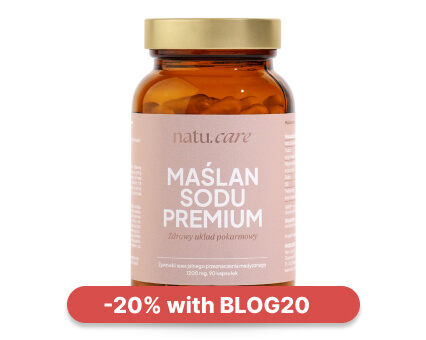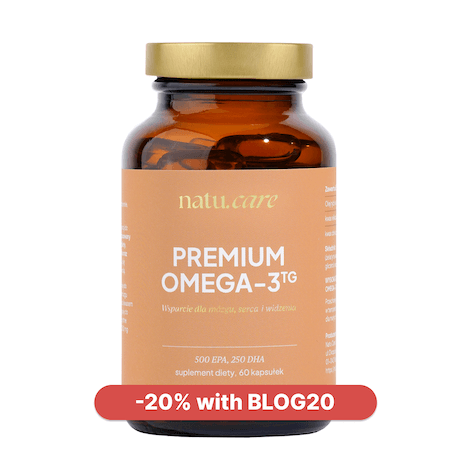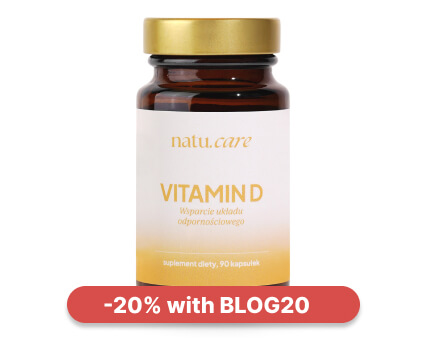World Water Day 2025 - what is it and when is it?
World Water Day aims to raise awareness of the lack of drinking water in many regions of the world.


Learn more about our editorial process
.

Learn more about our editorial process
.

Learn more about our editorial process
.

Learn more about our editorial process
.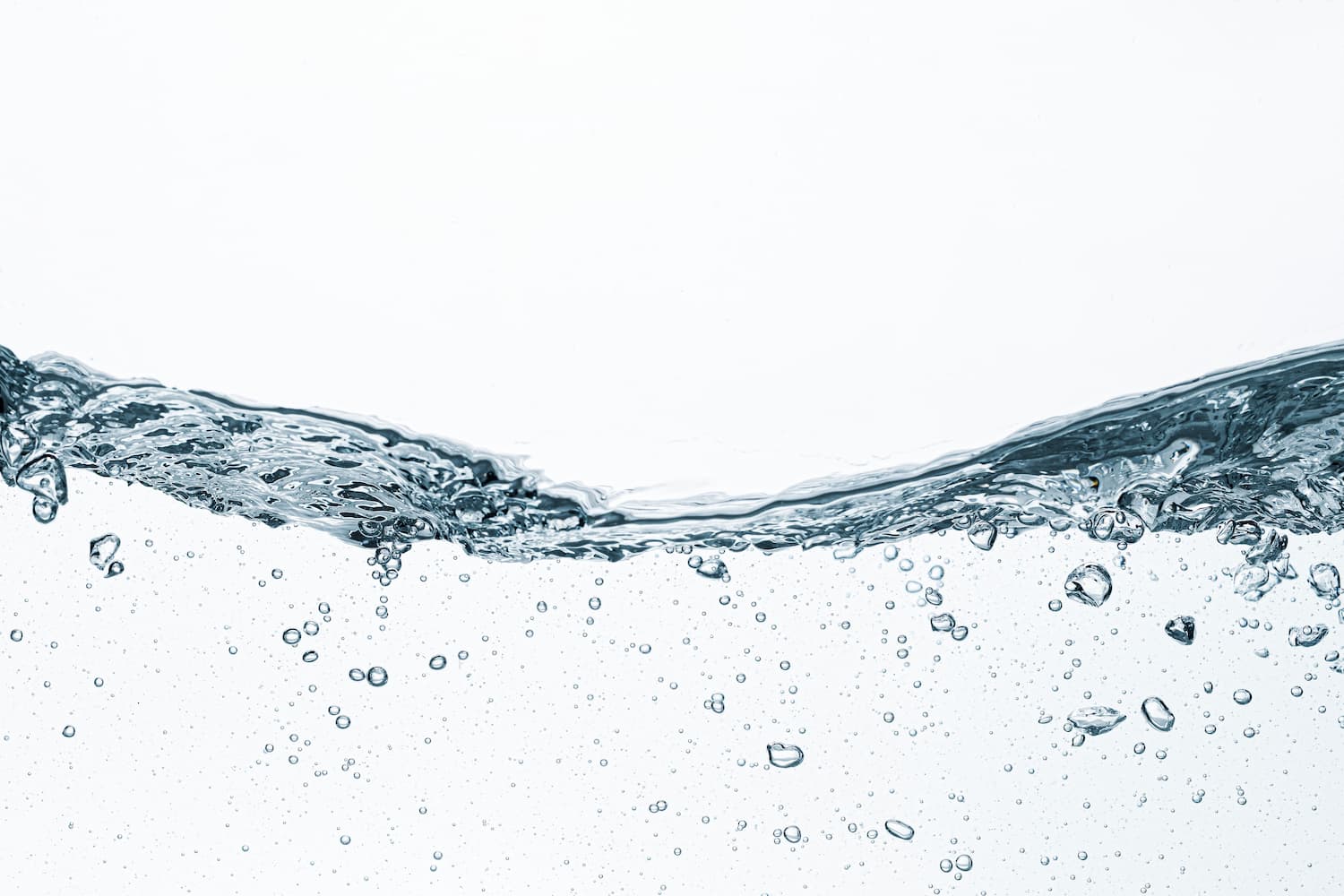
Why you can trust us
Articles on Natu.Care are written based on scientific research, data from government websites and other reliable sources. The texts are written in cooperation with doctors, nutritionists and other health and beauty experts. Articles are reviewed before publication and during significant updates.
.Learn more about our editorial process
.Information about advertisements
Content on Natu.Care may contain links to products from the sale of which we may receive a commission. When creating content, we adhere to high editorial standards and take care to be objective about the products discussed. The presence of affiliate links is not dictated by our partners, and we select the products we review ourselves completely independently.
.Learn more about our terms and Conditions
.Water is life - literally. Your body is about 60% made up of it. You can't last more than 72 hours without water, even though it contains no nutrients. Water covers 70% of the earth's surface and is used extensively in households, agriculture, water transport, electricity generation, or thermal and nuclear power plants.
This is why education about the problems of its scarcity and depletion is crucial. Together with Ilona Krzak, M.Sc. in Pharmacy, we will bring you closer to World Water Day and answer your burning questions.
World Water Day is a day of education.
From this article you will learn:
- What World Water Day is and when it falls.
- Why water is important.
- Why water is so important to us. .
- How much water do we use and how much do we actually need.
- Why water is important to us.
- Which countries have a water shortage.
- Why we need water.
- What to do to use less water on a daily basis.
- What to do to use less water on a daily basis.
See also:
- Hug Day
- Fish Day
- Bee Day
- Single's Day
- World No Smoking Day
- World Cancer Day
- World No Mobile Phone Day
- Bone Marrow Donor Day
- Blood Donation and Blood Donation Day
- Clean Air Day
- Food waste
- Lungs after a pandemic
- Thyroid Disease Awareness Month
What is World Water Day?
.World Water Day is an event celebrated every year 22 March. It is an international day established by the United Nations (UN) in 1993. It aims to draw public attention to the importance of clean water and promote the sustainable management of water resourcesand.
Each year World Water Day focuses on a different aspect related to this vital resource, such as protecting water-dependent ecosystems, promoting appropriate consumption or educating about water as a non-renewable resource.
What is the theme for World Water Day 2024?
.World Water Day 2024 focuses on the theme 'Water For Peace'. This theme highlights the role water plays in building or undermining peace. When access to water is unequal and resources are contaminated or insufficient, the risk of conflict between communities and nations increases.
Water in numbers
.
- In the world there are approx. 1,260,000,000,000,000,000,000 litres of waterand.
- Water accounts for approximately 71% of the earth's surface . .
- As much as 97% of water is found in the oceans . .
- Freshwater is only 3% of all water, of which only 0.5% is available to humans . .
- If we had 100 litres of water worldwide, drinking water would only include 0.003 litres (half a teaspoon) .
- Assuming that all the water in the world can fill a cup, just one drop would account for all the rivers and lakes .
- A mere 4 litres of petrol spilled could pollute around 2,839,000 litres of waterand.
- There can be as many as 1,000,000 microorganisms in a single drop of water. .
- One in three people in the world do not have access to clean drinking water. .
- The human brain is made up of 75% water; the lungs almost 90%; and the blood 82%.
How does water affect the body's function?
Water plays a key role in the functioning of every cell, tissue and organ in the body. It is essential for normal metabolic processes, fluid balance and thermoregulation.
What does water in the body affect?
.Temperature regulation
.Water plays an important role in the body's temperature regulation process. When the body's temperature rises - for example, during sport or being in a high ambient temperature, sweat glands in the skin begin to secrete sweat, which is mainly made up of waterand.
This process is designed to cool the skin and the entire body. When sweat evaporates, it consumes a large amount of heat, leading to an effective reduction in body temperature. Through this mechanism, the body is able to maintain an optimal and stable temperature, preventing overheatingand.
Transport of nutrients
.Water is the body's primary means of transport and therefore plays a key role in the delivery of nutrients to individual cells. The substances it contains can move freely throughout the body, allowing nutrients to reach every cell in the body from the digestive systemand.
Additionally, water is involved in metabolic processes, enabling the proper functioning of enzymes and hormones that are necessary for the absorption of these nutrients. It also acts as a means of transporting metabolic wastes out of the body, such as protein breakdown products or components not processed by the body, allowing them to be excreted through the kidneys, for exampleand.
Fluid balance
.Water is responsible for maintaining homeostasis, or the body's internal balance, and in particular fluid balance. The body is made up of approximately 60% water - this fluid is therefore essential for the proper functioning of all cells and tissuesand.
Water acts as a regulator, helping to maintain stable levels of electrolytes. This is important for processes such as muscle contractions, the conduction of nerve impulses and the maintenance of normal blood pressure. If necessary, the body is able to regulate water levels on its own through thirst or urinary excretionand.
A hormone called vasopressin is responsible for inhibiting water excretion, including reducing urine output..
 .
.
Ilona Krzak Master of Pharmacy
Participation in metabolic processes
.Water, as one of the most important components of the body, is involved in digestion, absorption and transfer of nutrients, as well as elimination of metabolic products. It acts as a vehicle by which nutrients can travel through the bodyand.
During the digestive process, water is essential for enzymes to function and allows nutrients to be absorbed efficiently. At the same time, through its participation in the excretion process, it helps to remove unnecessary and potentially harmful metabolic products of the body, such as alcohol and its metabolites or ammonia .
Compounds that are hardly soluble or insoluble in water are not metabolised - they are not absorbed from the gastrointestinal tract or are absorbed very slightly..
 .
.
Ilona Krzak Master of Pharmacy
Water lubrication joints
.Water plays an extremely important role in joint function - it acts as a lubricant, increasing flexibility and allowing smooth movement. Each joint in the body is surrounded by what is known as an articular capsule, which contains joint fluid, consisting mainly of waterand.
It is through water that the joint fluid exhibits lubricating and cushioning properties. A special layer provides an optimal environment for the joint bones, prevents them from rubbing excessively against each other and protects them from damage .
Nearly 95% of joint fluid is water, followed by hyaluronic acid and amino acids..
 .
.
Ilona Krzak Master of Pharmacy
Water also provides nutrients to the cartilage in the joints and removes waste products from the cartilage, which helps keep our joints healthy and resilient.
Important
Everyone should drink a minimum 30 ml/kg body weight of water every day for the body to function properly. Demand increases in people who are physically active, but also during hot weather or feverand.
Natu.Care Collagen Premium 5000 mg, mango & passion fruit

- Collagen content: 5000 mg marine collagen hydrolysate
- Additional active ingredients: vitamin C, low molecular weight hyaluronic acid (and L-theanine and coenzyme Q10 in cocoa flavoured collagen or vitamin A and vitamin E in mango–passion fruit flavoured collagen)
- Form: powder sachets
- Dose: 1 sachet per day
- Sufficient for: 30 days
Product description
Fish collagen from the Natu.Care brand in a dose of 5000 mg, based on certified ingredients of the best quality. Regular supplementation will positively influence the appearance of the skinóry, hairów and nails – they will be rebuilt and strengthened from the inside.
In addition to collagen, which is valuable for health and beauty, it also offers other active ingredients that help to maintain a youthful complexion, shiny hair and strong nails.
The formula contains a sufficient portion of the active ingredient to positively affect joints, the musculoskeletal system and immunity.
Natu.Care Premium Collagen is available in two flavours – Cacao Bloom and Rise&Shine. Both formulas are based on the following active ingredients: marine collagen hydrolysate, wild roseóbud extract and hyaluronic acid.
Additionally, Cacao Bloom contains natural L-theanine, coenzyme Q10 and defatted Dutch cacao. Rise&Shine instead contains vitamin E and vitamin A.
These are the best collagens in the world.
These best fish collagens on the market also rós taste – Cacao Bloom is a treat for chocolate lovers. Rise&Shine will appeal to those whoólike the refreshing taste of mangoófruit and passion fruit.
Pros and cons
Pros:
- Vitamin C supports the body's collagen production, enhancing its effectiveness.
- An effective dose of hyaluronic acid, which additionally supports skin hydration and joint health.
- Fish collagen absorbs 50% better. Additionally, the manufacturer specifies the fish species it is sourced from (Atlantic cod).
- The composition has been tested by the independent and accredited J.S. Hamilton laboratory.
- MSC (Marine Stewardship Council) quality certification, which confirms that the collagen source supports sustainable fishing practices.
Cons:
- None.
Additional information
Natu.Care's fish collagen receives praise for its delicious taste. You won't find the fishy aftertaste that often comes through in other collagens. Plus, you have two tasty flavors to choose from: cocoa and mango-passionfruit.
Active ingredients like coenzyme Q10, hyaluronic acid, and natural L-theanine provide anti-inflammatory and antioxidant benefits while slowing down aging processes.
User review
Super, after about 6 weeks of use, the skin on my face became noticeably firmer. Wonderful taste.
Ania ZalewskaNatu.Care customer
Natu.Care Premium collagen 10 000 mg, mango-maracuja
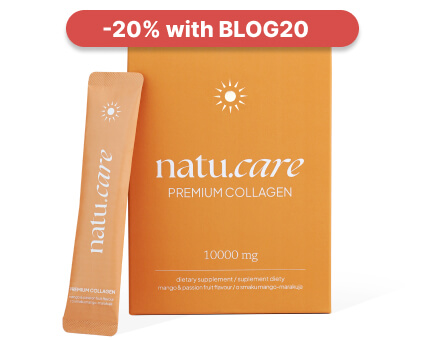
- Collagen content: 10,000 mg marine collagen hydrolysate
- Additional active ingredients: vitamin C, low molecular weight hyaluronic acid (and L-theanine and coenzyme Q10 in cocoa flavoured collagen or vitamin A and vitamin E in mango–passion fruit flavoured collagen)
- Form: powder sachets
- Dose: 1 sachet per day
- Sufficient for: 30 days
Product description
One of the strongest collagens on the market, whichós provides as much as 10,000 mg in a daily serving. This allows the formula to effectively support the condition of the skin, hair and nails.
With this supplement, you will support your beauty, which will allow you to visually stop the ageing process and feel a second youth!
Natu.Care Collagen Premium 10 000 mg comes in two flavours – cherry and mango-maracuja. Both formulas have the same product backbone – collagen, hyaluronic acid and vitamin C.
In the cherry version you additionally find glucosamine, chondroitin and Indian frankincense resin extract. Mango-maracuja, on the other hand, contains vitamin E and vitamin A.
Pros and cons
Pros:
- Tested collagen formula – SeaGarden, whose effects have been confirmed in clinical studies.
- Effective dose of hyaluronic acid, additionally moisturizing the skin and positively impacting joint health.
- Vitamin C supports the body’s natural collagen production.
- The composition has been tested by the independent and accredited J.S. Hamilton laboratory.
- The product has an MSC (Marine Stewardship Council) quality certification – the collagen source supports sustainable fishing practices.
Cons:
- None.
Additional information
Users praise Natu.Care Collagen Premium for the easy dissolvability of the powder.
User review
I noticed a significant improvement in my skin texture after a few weeks of taking collagen regularly. My complexion is now as soft as velvet!
Natu.Care Collagen Premium 10000 mg, cherry

- Collagen content: 10,000 mg of hydrolyzed bovine collagen
- Additional active ingredients: vitamin C, low molecular weight hyaluronic acid, glucosamine, chondroitin, extract of Indian frankincense resin (boswellia serrata)
- Form: powder sachets for drinking
- Serving: 1 sachet per day
- Lasts for: 30 days
Product description
One of the strongest collagens on the market, providing as much as 10,000 mg per daily serving. This product can effectively support the condition of joints, skin, hair, and nails.
With this supplement, you will support your skeletal and joint system as well as your beauty, helping you visually halt the aging process and feel rejuvenated!
Pros and cons
Pros:
- The daily portion of collagen is very large – as much as 10,000 mg.
- Proven collagen formula – COLLinstant, whose effectiveness has been confirmed in clinical studies.
- Effective dose of hyaluronic acid, which additionally moisturizes the skin and positively affects joint health.
- Vitamin C supports the body's natural collagen production.
- Glucosamine is a fundamental building block of compounds found in joint cartilage and a component of collagen that gives elasticity to connective tissue in tendons.
- Chondroitin is a natural component found in the human body, mainly in cartilage. This large molecule (mucopolysaccharide) has the ability to absorb water, which helps maintain the elasticity and resilience of cartilage.
- Frankincense resin extract supports blood circulation and joint mobility and reduces their stiffness. It may help alleviate inflammatory conditions.
- The composition has been tested by the independent and accredited J.S. Hamilton laboratory.
Cons:
- None.
Additional information
Users praise Natu.Care Collagen Premium for the easy dissolving of the powder.
Premium Sodium Butyrate
Product description
Premium Sodium Butyrate is a natural support for your digestive system. With a high dose of butyric acid (940 mg), it supports the regeneration of the intestinal mucosa, improving gut health and function, and aids in the absorption of nutrients. By taking care of your intestines, you're taking care of the health of your entire body.
Studies involving people suffering from irritable bowel syndrome confirm that sodium butyrate is ideal for supporting issues related to bacterial flora imbalances (for example, after antibiotic therapy), constipation and diarrhea, inflammation of the intestinal mucosa, or a diet low in fiber.
Premium Sodium Butyrate capsules are made using the innovative DRcaps® technology. This guarantees that the active ingredients in the product are protected from the destructive effects of stomach acids and digestive enzymes. As a result, we can be sure that the beneficial ingredients are released in the small intestine and are fully absorbed by our body.
Premium Sodium Butyrate from Natu Care is 100% tested, and its composition contains only the highest quality raw materials.
Pros and cons
Pros:
- Supports digestive system function
- Helpful for various gastrointestinal conditions, including IBS
- High dose of butyric acid in each capsule
- Eco-friendly, clean, and tested composition
- Free from added sugar, gluten, GMOs, and lactose
- Innovative capsule technology - DRcaps
Cons:
- None
Additional Information
Take 3 capsules daily at any time of the day, preferably with a meal. Swallow the capsules whole with water.
Premium Sodium Butyrate is intended for adults.
The product should be used under medical supervision.
User review
I've been using the product for 2 weeks. My stomach feels lighter, and my digestion has improved. I recommend it.
Natu.Care Premium Magnesium + Vitamin B6
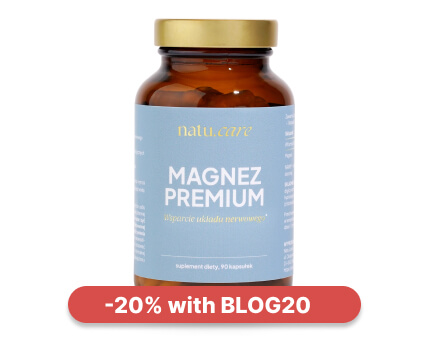
- Magnesium content per day: 305 mg
- Additional active ingredients: Vitamin B6 (2.1 mg)
- Form: capsules
- Serving size: 3 capsules per day
- Sufficient for: 30 days
Product description
The Premium Magnesium + Vitamin B6 dietary supplement is a comprehensive product that combines three organic forms of magnesium (citrate, malate, and diglycinate) and vitamin B6 in highly absorbable forms.
Magnesium is an essential mineral without which our bodies cannot function properly. It supports the immune, nervous, and muscular systems, maintains electrolyte balance, and is involved in cell division and the regulation of mental functions.
Research shows that magnesium supplementation is even more effective when accompanied by vitamin B6, which is included in our product. Vitamin B6 is responsible for the proper functioning of the nervous and immune systems, as well as the proper functioning of the heart.
If you want to safely get rid of feelings of fatigue, concentration problems, hair loss, muscle cramps, trembling, or irritability, reach for Premium Magnesium from Natu.Care, tested by the independent, certified laboratory J.S. Hamilton Poland.
Pros and cons
Pros
- Supports the proper functioning of the nervous and immune systems.
- Reduces feelings of fatigue and tiredness.
- Maintains proper psychological functions.
- The purity of the ingredients (free from anti-caking agents, artificial fillers, and additives such as titanium dioxide, microcrystalline cellulose, talc, magnesium stearate, and silicon dioxide) has been confirmed by laboratory tests.
- High absorption of ingredients.
- Soft capsules that are easy to swallow.
- Suitable for vegetarians and vegans.
Cons
- None.
Additional information
Take with a meal, 3 capsules per day.
The capsules should be taken with at least 250 ml of water.
If you have trouble sleeping, it is advisable to take 1 capsule in the morning and 2 capsules in the evening, no later than 4 hours before bedtime.
Avoid combining with products high in calcium (milk, yogurt, cheese), as this may negatively affect magnesium absorption.
Pregnant and breastfeeding women should consult a doctor before starting supplementation.
User review
I’m very impressed with the speed of delivery. The product itself is of high quality and absorbs well. After two weeks of supplementation, I’ve noticed a significant improvement in muscle recovery, especially during periods of intense training. I highly recommend it!
Product description
The dietary supplement contains omega-3ᵀᴳ, or omega-3 acids in the form of trójglyceridesów. Scientific studies suggest that this form of fatty acidsós up to 2 times better absorbed than the estersós present in many dietary supplements on the market. This means that you are assured of their effectiveness and of supplying yourself with valuable omega acids.
Fatty acids omega-3 are derived from wild anchovy oil. It is a rich source of healthy fats that are essential for the health of the cardiovascular, immune and nervous systems, as well as the proper function of vision, joints muscles.
Scientific research suggests that wild anchovies are a good source of healthy fats.
Scientific research also suggests that an adequate intake of omega-3 fatty acidsós protects against and supports the treatment of depression and anxiety disorders. In addition, omega-3s influence the hydration and appearance of the skinóry and support healthy sleep.
.
The formula contains a total of 750 mg of EPA+DHA acidsós, which is three times higher than the recommended minimum of 250 mg for the Polish population. Omega-3 TG Premium has studies indicating that its TOTOX is 9, which is a very good result.
Supplementation of omega-3 fatty acidsóis recommended for anyone who does not eat 1–2 portions (approximately 300 g) of oily fish per week. Children during growth, seniors, physically active people, vegans and vegetarians, as well as patients undergoing cardiovascular treatment and prevention of heart disease also have an increased need.
Pros and cons
The dietary supplement contains omega-3ᵀᴳ, or omega-3 acids in the form of trójglyceridesów. Scientific studies suggest that this form of fatty acidsós up to 2 times better absorbed than the estersós present in many dietary supplements on the market. This means that you are assured of their effectiveness and of supplying yourself with valuable omega acids.
Fatty acids omega-3 are derived from wild anchovy oil. It is a rich source of healthy fats that are essential for the health of the cardiovascular, immune and nervous systems, as well as the proper function of vision, joints muscles.
Scientific research suggests that wild anchovies are a good source of healthy fats.
Scientific research also suggests that an adequate intake of omega-3 fatty acidsós protects against and supports the treatment of depression and anxiety disorders. In addition, omega-3s influence the hydration and appearance of the skinóry and support healthy sleep.
.
The formula contains a total of 750 mg of EPA+DHA acidsós, which is three times higher than the recommended minimum of 250 mg for the Polish population. Omega-3 TG Premium has studies indicating that its TOTOX is 9, which is a very good result.
Supplementation of omega-3 fatty acidsóis recommended for anyone who does not eat 1–2 portions (approximately 300 g) of oily fish per week. Children during growth, seniors, physically active people, vegans and vegetarians, as well as patients undergoing cardiovascular treatment and prevention of heart disease also have an increased need.
Additional information
The dietary supplement contains omega-3ᵀᴳ, or omega-3 acids in the form of trójglyceridesów. Scientific studies suggest that this form of fatty acidsós up to 2 times better absorbed than the estersós present in many dietary supplements on the market. This means that you are assured of their effectiveness and of supplying yourself with valuable omega acids.
Fatty acids omega-3 are derived from wild anchovy oil. It is a rich source of healthy fats that are essential for the health of the cardiovascular, immune and nervous systems, as well as the proper function of vision, joints muscles.
Scientific research suggests that wild anchovies are a good source of healthy fats.
Scientific research also suggests that an adequate intake of omega-3 fatty acidsós protects against and supports the treatment of depression and anxiety disorders. In addition, omega-3s influence the hydration and appearance of the skinóry and support healthy sleep.
.
The formula contains a total of 750 mg of EPA+DHA acidsós, which is three times higher than the recommended minimum of 250 mg for the Polish population. Omega-3 TG Premium has studies indicating that its TOTOX is 9, which is a very good result.
Supplementation of omega-3 fatty acidsóis recommended for anyone who does not eat 1–2 portions (approximately 300 g) of oily fish per week. Children during growth, seniors, physically active people, vegans and vegetarians, as well as patients undergoing cardiovascular treatment and prevention of heart disease also have an increased need.
Expert opinion
The dietary supplement contains omega-3ᵀᴳ, or omega-3 acids in the form of trójglyceridesów. Scientific studies suggest that this form of fatty acidsós up to 2 times better absorbed than the estersós present in many dietary supplements on the market. This means that you are assured of their effectiveness and of supplying yourself with valuable omega acids.
Fatty acids omega-3 are derived from wild anchovy oil. It is a rich source of healthy fats that are essential for the health of the cardiovascular, immune and nervous systems, as well as the proper function of vision, joints muscles.
Scientific research suggests that wild anchovies are a good source of healthy fats.
Scientific research also suggests that an adequate intake of omega-3 fatty acidsós protects against and supports the treatment of depression and anxiety disorders. In addition, omega-3s influence the hydration and appearance of the skinóry and support healthy sleep.
.
The formula contains a total of 750 mg of EPA+DHA acidsós, which is three times higher than the recommended minimum of 250 mg for the Polish population. Omega-3 TG Premium has studies indicating that its TOTOX is 9, which is a very good result.
Supplementation of omega-3 fatty acidsóis recommended for anyone who does not eat 1–2 portions (approximately 300 g) of oily fish per week. Children during growth, seniors, physically active people, vegans and vegetarians, as well as patients undergoing cardiovascular treatment and prevention of heart disease also have an increased need.
Natu.Care Vitamin D 2000 UI
Product description
Vitamin D plays a crucial role in our health and well-being. It affects calcium and phosphate metabolism, which translates to healthy bones and teeth. It also helps regulate the immune system, and studies indicate its influence on the functioning of the nervous system.
Vitamin D, although called a “vitamin,” is actually a prohormone that our body produces on its own, primarily under the influence of sunlight. Unfortunately, our modern lifestyle contributes to deficiencies of this essential vitamin. Working in enclosed office buildings, using (necessary!) SPF creams, and covering the body with clothing all make it very difficult, if not impossible, to obtain adequate levels of vitamin D from sunlight. This is why appropriate, year-round supplementation is so crucial.
Vitamin D from Natu.Care is a well-tested vitamin D3 suspended in safflower oil, a plant known for its numerous health benefits. The convenient, easy-to-swallow capsule will make supplementation a part of your daily, healthy routine, improving your overall well-being.
Pros and cons
Pros:
- Ensures proper functioning of the immune system
- Supports the maintenance of healthy bones and teeth
- Maintains proper heart, kidney, and muscle function
- Tested by an independent, certified laboratory
- Convenient and easy-to-swallow capsule
- Clean composition - free from added sugar, gluten, GMOs, lactose, and without preservatives or colorants
Cons:
- None.
Additional Information
Pregnant women and breastfeeding mothers should consult a doctor before using the product. This dietary supplement is intended for a healthy adult population up to the age of 75.
Collagen Booster - Glow Stories
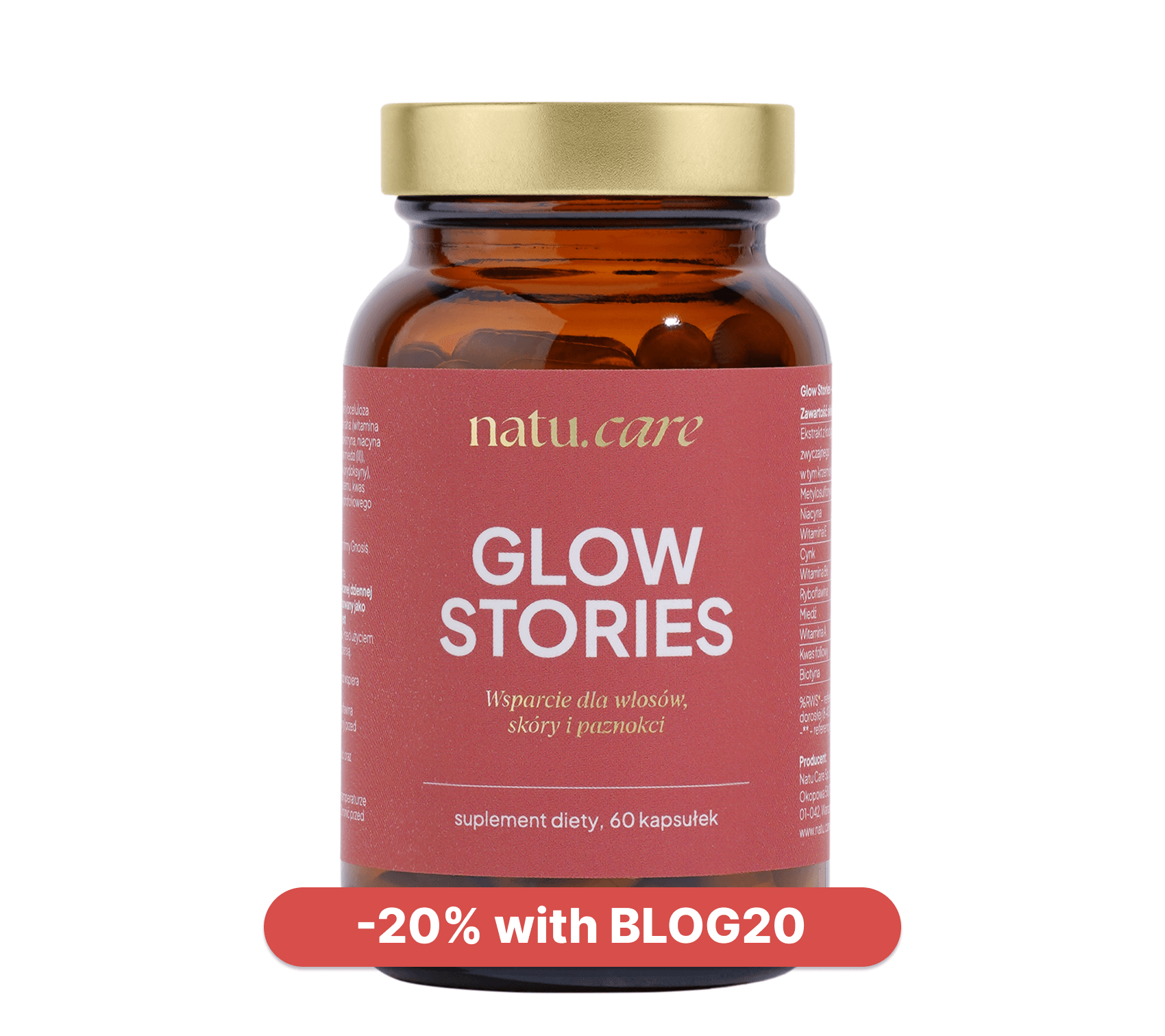
- Active ingredients: bamboo shoot extract, Quatrefolic®, L-Methionine, L-cysteine, vitamin E, vitamin A, niacin (vitamin B3), vitamin B6, vitamin B2 (riboflavin), biotin, zinc, copper
- .
- Form: capsules
- .
- Dose: 1 capsule per day
- .
- Sufficient for: 60 days
- .
Product description
A dietary supplement containing vitamins, minerals and plant extracts thatósupport the skinóhand, hair and nails. The product is especially distinguished by the form of folate – it is Quatrefolic, whichós absorbed very well and is natural.
In addition to valuable vitamins and minerals, such as vitamin A, E, B3, B2 and biotin, the formula contains bamboo shoot extract, whichóry further enhances your beauty.
Pros and cons
A dietary supplement containing vitamins, minerals and plant extracts thatósupport the skinóhand, hair and nails. The product is especially distinguished by the form of folate – it is Quatrefolic, whichós absorbed very well and is natural.
In addition to valuable vitamins and minerals, such as vitamin A, E, B3, B2 and biotin, the formula contains bamboo shoot extract, whichóry further enhances your beauty.
Additional information
A dietary supplement containing vitamins, minerals and plant extracts thatósupport the skinóhand, hair and nails. The product is especially distinguished by the form of folate – it is Quatrefolic, whichós absorbed very well and is natural.
In addition to valuable vitamins and minerals, such as vitamin A, E, B3, B2 and biotin, the formula contains bamboo shoot extract, whichóry further enhances your beauty.
How much water do we need vs. how much do we consume?
.Let's not kid ourselves - each of us uses more water than we need. However, this is only natural - if we think something is 'infinite', why should we conserve it? After all, it doesn't matter if the water from your tap runs for 2 minutes or 2 hours, you probably won't run out of it anyway.
It's not that simple, however. Saving water is extremely important, but we'll get to that a little later. First, let's look at how much more water we use than we actually need.
How much water do we need per day?
.According to the recommendations of the World Health Organisation, the minimum water consumption necessary to maintain basic hygiene and health is about 50 litres per person per day. This amount allows for drinking, washing clothes, preparing meals or general cleanlinessand.
How much water do Poles use?
.According to the Central Statistical Office, the average per capita household water consumption in 2021 was 33.5 m³, or 33,500 litres. We can therefore easily calculate that, on average, we use 91 litres of water per day. And this is a very good result indeed. The average daily per capita water consumption in Europe is around 144 litres of waterand.
How to hydrate properly
.Adequate hydration is key to maintaining health and well-being. Insufficient fluids can lead to low performance, fatigue and even dehydration. What can be done to avoid such conditions?
- Regular fluid intake. Proper hydration involves drinking regularly, even if you don't feel thirsty. It is suggested that you take in about 2-3 litres of fluids a day, depending on your age, gender, physical activity, health status and ambient temperature.
- Drink water. Although different sources of fluids can be considered, water should make up the majority. It does not contain sugar or extra kilocalories. It is also worth considering mineral water, which provides valuable electrolytes. .
- Hydration before, during and after exercise. Physical activity increases the need for fluids. Therefore, it is a good idea to drink before training, regularly during and after exercise to compensate for lost water.
- Drink fluids with meals. Drinking fluids with meals can aid digestion and help us reach the recommended daily amount of fluids. However, avoid drinking large amounts of water just before a meal to avoid artificially reducing your appetite. .
- Climit diuretic and dehydrating drinks. Alcohol, caffeine, some herbs and even coca-cola can accelerate dehydration. Therefore, consumers of these beverages should pay particular attention to extra hydration.
King's water is not the mineral water served to the king in a golden goblet. This is the name given to a mixture of concentrated acids: nitric (V) and hydrochloric in a ratio of 3:1. It is extremely corrosive. It even dissolves precious metals such as gold..
 .
.
Ilona Krzak Master of Pharmacy
What happens in the body when you are dehydrated?
.Dehydration occurs when the body loses more fluids than it can replenish, resulting in insufficient water needed to function properly. This leads to an imbalance of electrolytes, such as sodium and potassium, which are essential for the proper functioning of cells and organsand.
As dehydration progresses, a person may experience initial symptoms such as dry mouth, fatigue, headaches and even slight decreases in mental and physical performance. There may also be muscle weakness, accelerated heart rate and, in extreme cases, even unconsciousnessand.
Hydration is a serious condition that can lead to life-threatening complications such as kidney damage, hypovolemic shock (a significant drop in blood volume) and even death. Therefore, it is important to keep your body adequately hydratedand.
The first step during a headache should be to reach for a glass of water. Often insufficient hydration is precisely what manifests itself as a headache. Similarly with a fever. Adequate hydration can lower the temperature without the use of medication..
 .
.
Ilona Krzak Master of Pharmacy
In which countries is there a shortage of drinking water?
.Lack of access to clean drinking water is a worldwide problem that particularly affects low-income countries, especially in arid and desert areas. It is a complex situation that ranges from climatic conditions to infrastructure issues, water resource management and political conflict and instability. Which countries are the worst affected?"
.Pakistan's water shortage is a major concern.
|
Country |
Reasons for water shortages |
|
|
Liban |
The country is in economic crisis and suffers from poor management of water systems. More than 71% of the population faces a critical shortage of drinking water. The situation is exacerbated by a prolonged drought in the region. Water prices have skyrocketed and refugee communities are most vulnerable to water shortages. |
|
|
Pakistan |
The causes of water shortages in Pakistan are rapid population growth and urbanisation, as well as climate change. More than 16 million people in Karachi alone do not have access to clean water. | |
|
Afghanistan . |
The water shortage is worsening due to recent political turmoil, conflict, natural disasters, economic instability and climate change. The drought there is the worst such situation in 27 years. |
|
|
Syria |
The country is facing its worst drought in 70 years, caused by low water levels on the Euphrates River. In addition, more than a decade of conflict has only exacerbated the situation.
| Syria is facing its worst drought in over a decade. |
|
Niger |
The entire country, located in the Sahara, is threatened by drought. UNICEF estimates that only 56% of Niger's citizens have access to a source of potable water and only 13% have access to basic sanitation services. |
What is the situation in Poland?
.Poland also faces the problem of water scarcity. We are one of the countries in Europe with the most limited water resources. The average annual water resources per inhabitant in Poland are about 1,600 m³, which is as much as for a statistical citizen of Egypt. In comparison, the European average is around 4,300 m³and.
The main cause of water scarcity is insufficient retention, i.e. the earth's ability to hold water. Poland has one of the lowest retention values in Europe, which means that a lot of rainwater or water from melting snow is quickly discharged into rivers and the sea, rather than stored for later use.
Why is water scarce?
Why is there a shortage of drinking water in the world?
.World drinking water scarcity is one of the most serious global challenges of the 21st century. Key factors contributing to the problem include rapid population growth, increasing demand for water in agriculture, industries and households, climate change, pollution of water resources and inadequate water infrastructure.
Population growth
.Population growth is one of the main factors contributing to the increasing demand for drinking water. As the Earth's population grows, so does the need to provide increasing amounts of clean, safe water for drinking, cooking, washing, sanitation needs and for domestic and industrial use.
The need to provide clean, safe water for drinking, cooking, washing, sanitation needs and for domestic and industrial use is growing.
This challenge is particularly pronounced in developing countries, where demographic growth rates are much higher and access to clean drinking water is often limited.
In addition, rapid urbanisation and migration of populations to cities brings additional problems related to the provision of adequate water infrastructure, which can also hinder access to clean water.
Climate change
.Global warming is leading to an intensification of extreme weather events such as droughts, floods or violent storms, which can have a direct impact on water resources. Drought, for example, can harm both the quality and quantity of available water, causing water shortages in affected regions.
Rising temperatures, on the other hand, lead to faster evaporation of water, causing changes in surface and groundwater flow. This, in turn, can affect the availability of drinking water, especially in regions that already face water shortages.
Pollution
Water pollution
.Water pollution renders available resources unfit for consumption or use, both for humans and wildlife. Industry, agriculture and urban waste are the main sources that introduce toxins and pathogens into water resources. Without proper treatment systems, such water is not safe for use.
.Secondly, water pollution can damage aquatic ecosystems, leading to a loss of biodiversity and a declining ability of ecosystems to clean water naturally. Effects such as eutrophication, caused by excessive nutrients (e.g. nitrogen and phosphorus) in water, can lead to algal blooms that further pollute the water.
Finally, climate change associated with greenhouse gas emissions can contribute to the pollution and degradation of water resources through changes in the water cycle, such as droughts or floods, which in turn can exacerbate water scarcity. Thus, pollution of water resources not only limits the availability of clean water, but also exacerbates the problem of water scarcity worldwide.
Inadequate water infrastructure
.Water infrastructure includes elements such as water delivery systems, wastewater treatment plants, dams and dikes. This is essential for collecting, storing, treating and distributing water to end-users, in both domestic and industrial contexts.
>In many regions around the world, especially in developing countries, water infrastructure is inadequate. This leads to a situation where access to clean, safe water is limited. Furthermore, inefficient systems can result in significant losses - for example, through leaking pipes or inadequate storage.
Additionally, climate change may exacerbate the problem of inadequate water infrastructure. Rising temperatures and changes in precipitation patterns may exceed the capacity of existing systems to collect and process water, further exacerbating the problem of water shortages.
When the problem of water shortages is not addressed at all, it is likely to become more acute.
When will there be a complete shortage of potable water?
.It is very difficult to pinpoint exactly when the world will run out of potable water, as this depends on a number of factors, such as the rate of climate change, global and local water resource management activities, and changes in consumption patterns.
The world will run out of water.
However, it is estimated, that at current rates of water use, about ⅔ of the world will experience water scarcity by 2030-2040. However, this predicted situation, known as a 'water crisis', does not mean that there will be a complete shortage of drinking water. Different regions will be affected to varying degrees, and some places may experience extreme water shortages.
How does pollution of water bodies affect fauna?
.Pollution of water bodies has a strong impact on the animals that live in the water. It disrupts the balance of the ecosystem and directly affects the health and survival of aquatic animals.
- Negative impact on animal health. Polluted waters are full of chemicals and toxic substances that can accumulate in animals' bodies, leading to disease and even death. In the long term, these pollutants can also result in genetic changes and deformities. .
- Decrease in biodiversity. As a result of water pollution, many aquatic animal species can become extinct. These creatures are unable to adapt to changing conditions. The result will be a reduction in biodiversity and an imbalance of aquatic ecosystems.
- Changing the food chain. Pollution of water resources can also disrupt the food chain. Animals at the lower levels of the food chain may die or reduce their populations, which in turn will affect predators at the higher levels.
- Deterioration of habitat quality. Aquatic pollution can significantly degrade the quality of animal habitat, leading to mass migration or extinction of species unable to adapt to new conditions.
How to use less water on a daily basis?
.Water resources are limited, so each of us should try to reduce our daily water consumption. There are many simple ways to save that make a big difference when used on a larger scale.
Turning off the tap
.Turning off the tap during everyday activities, such as brushing your teeth or shaving, is one of the simplest ways to save water at home. Many of us have a habit of leaving the tap turned off during these activities, leading to completely unnecessary water wastage.
For example, when brushing our teeth, we can use up up to 6 litres of water per minute. Turning off the tap for those 2-3 minutes can therefore save a significant amount of water every day. Such small changes in daily habits can translate into significant savings in the long term, helping to conserve global water resources.
Saving in the shower
.Conscious use of the shower is one of the easiest ways to save water on a daily basis. In practice, this involves turning off the water when washing your body or hair. While these may seem like small changes, when you include multiple users, you will save hundreds of litres of water.
Efficient dishwashing and clothes washing
.Instead of leaving the water turned off while washing dishes, a better solution is to soak them for a period of time and then rinse them more quickly. Importantly, it is worth using the dishwasher. In general, the equipment uses about three times less water per washing cycle than when washing by hand.
Similarly, when it comes to washing clothes, it is a good idea to fill the washing machine as much as possible, which is more efficient in terms of water consumption than washing smaller amounts of clothes more often.
Wise watering of plants
.Best practice is to water plants in the early morning or late evening when water evaporation is low. This allows for better soil hydration and efficient use of water. Using drip systems can also minimise water wastage.
Rainwater harvesting
.Installing rainwater harvesting systems allows water to be collected, which can then be used for watering plants, washing cars or even flushing the toilet. These systems usually consist of barrels placed under the gutters to collect the falling water. This is not only a way to save water, but also to reduce bills.
Drop drills... deficit
Regularly check all faucets and pipes in your home for leaks. Even a small leak can result in a large loss of water!
Regularly check all faucets and pipes in your home for leaks.
Summary
.- World Water Day is celebrated on 22 March with the aim of drawing attention to the importance of clean water and promoting water stewardship.
- Water plays key roles in the functioning of the body, such as regulating temperature, transporting nutrients, maintaining fluid balance and participating in metabolic processes.
- Water consumption is an important part of water management.
- The average water consumption per person in Poland is about 91 litres per day, while the minimum recommended needs are around 50 litres. .
- Lack of access to clean drinking water is a major problem worldwide, especially in low-income countries, and even more so if they are located in arid and desert areas.
- Potential lack of access to clean water is a major problem.
- The potential shortage of drinking water is related to rapid population growth, increasing water demand, climate change, pollution of water resources and insufficient water infrastructure.
- Effective water conservation at home consists of activities such as turning off the tap during daily activities, using the shower consciously, washing dishes and washing clothes efficiently, watering plants sensibly and collecting rainwater for domestic use.
FAQ
.Do houseplants need a lot of water?
.It depends on the type of plant. Some, such as cacti, need very little water, so they are an excellent choice for those who want to save water. Others, however, such as ferns or monstera, need regular watering.
What are the effects of body dryness on the skin and body?
.Body dryness, or dehydration, has a negative impact on the body as a whole. The skin, for example, can become dry, flaky and less elastic, resulting in discomfort, susceptibility to infection and an acceleration of the ageing process.
Does meat consumption affect water consumption?
.Meat production is definitely more demanding in terms of water consumption than the production of plant-based foods. For example, producing 1 kg of beef can involve using up to 15 000 litres of water. Switching to a predominantly plant-based diet is therefore one way to save water.
Will droughts become more frequent due to global warming?"
.Yes, droughts are one of the most anticipated impacts of global warming. Future climate change could lead to longer and more intense droughts, especially in parts of the world that already face water shortages.
How does air pollution affect water resources?
.Air pollution can affect water resources in various ways. For example, when precipitation, such as rain or snow, passes through polluted air, it can absorb these pollutants and transmit them to rivers and lakes.
What health problems can regular consumption of contaminated water lead to?
.It poses a public health risk, leading to various diseases such as diarrhoeal diseases, parasitic diseases, skin diseases and even some types of cancer.
Do alcoholic drinks dehydrate the body?
.Yes, alcohol is a diuretic, meaning that it increases urine production, leading to faster elimination of fluids from the body. Drinking alcoholic beverages can therefore result in dehydration, so it is always worth remembering to stay extra hydrated when consuming spirits.
Resources
.See all
.1 in 3 people globally do not have access to safe drinking water - UNICEF, WHO. (n.d.). Retrieved 9 February 2024, from https://www.who.int/news/item/18-06-2019-1-in-3-people-globally-do-not-have-access-to-safe-drinking-water-unicef-who
Armstrong, L. E., & Johnson, E. C. (2018a). Water Intake, Water Balance, and the Elusive Daily Water Requirement. Nutrients, 10(12), 1928. https://doi.org/10.3390/nu10121928
Armstrong, L. E., & Johnson, E. C. (2018b). Water Intake, Water Balance, and the Elusive Daily Water Requirement. Nutrients, 10(12), 1928. https://doi.org/10.3390/nu10121928
Bottin, J. H., Morin, C., Guelinckx, I., & Perrier, E. T. (2019). Hydration in Children: What Do We Know and Why Does it Matter? Annals of Nutrition & Metabolism, 74 Suppl 3, 11-18. https://doi.org/10.1159/000500340
Çıtar Dazıroğlu, M. E., & Acar Tek, N. (2023). Water Consumption: Effect on Energy Expenditure and Body Weight Management. Current Obesity Reports, 12(2), 99-107. https://doi.org/10.1007/s13679-023-00501-8
Davidhizar, R., Dunn, C. L., & Hart, A. N. (2004). A review of the literature on how important water is to the world's elderly population. International Nursing Review, 51(3), 159-166; discussion 134. https://doi.org/10.1111/j.1466-7657.2004.00224.x
Gandy, J. (2015). Water intake: Validity of population assessment and recommendations. European Journal of Nutrition, 54 Suppl 2(Suppl 2), 11-16. https://doi.org/10.1007/s00394-015-0944-8
Jéquier, E., & Constant, F. (2010). Water as an essential nutrient: The physiological basis of hydration. European Journal of Clinical Nutrition, 64(2), 115-123. https://doi.org/10.1038/ejcn.2009.111
Kleiner, S. M. (1999). Water: An essential but overlooked nutrient. Journal of the American Dietetic Association, 99(2), 200-206. https://doi.org/10.1016/S0002-8223(99)00048-6
Liska, D., Mah, E., Brisbois, T., Barrios, P. L., Baker, L. B., & Spriet, L. L. (2019a). Narrative Review of Hydration and Selected Health Outcomes in the General Population. Nutrients, 11(1), 70. https://doi.org/10.3390/nu11010070
Liska, D., Mah, E., Brisbois, T., Barrios, P. L., Baker, L. B., & Spriet, L. L. (2019b). Narrative Review of Hydration and Selected Health Outcomes in the General Population. Nutrients, 11(1), 70. https://doi.org/10.3390/nu11010070
Martínez García, R. M., Jiménez Ortega, A. I., Lorenzo-Mora, A. M., & Bermejo, L. M. (2022). [Importance of hydration in cardiovascular health and cognitive function]. Nutricion Hospitalaria, 39(Spec No3), 17-20. https://doi.org/10.20960/nh.04304
Meinders, A.-J., & Meinders, A. E. (2010). [How much water do we really need to drink?]. Nederlands Tijdschrift Voor Geneeskunde, 154, A1757.
.Millard-Stafford, M., Wendland, D. M., O'Dea, N. K., & Norman, T. L. (2012). Thirst and hydration status in everyday life. Nutrition Reviews, 70 Suppl 2, S147-151. https://doi.org/10.1111/j.1753-4887.2012.00527.x
Nakamura, Y., Watanabe, H., Tanaka, A., Yasui, M., Nishihira, J., & Murayama, N. (2020). Effect of Increased Daily Water Intake and Hydration on Health in Japanese Adults. Nutrients, 12(4), 1191. https://doi.org/10.3390/nu12041191
Palma, L., Marques, L. T., Bujan, J., & Rodrigues, L. M. (2015). Dietary water affects human skin hydration and biomechanics. Clinical, Cosmetic and Investigational Dermatology, 8, 413-421. https://doi.org/10.2147/CCID.S86822
Popkin, B. M., D'Anci, K. E., & Rosenberg, I. H. (2010). Water, Hydration and Health. Nutrition reviews, 68(8), 439-458. https://doi.org/10.1111/j.1753-4887.2010.00304.x
Ritz, P., & Berrut, G. (2005). The importance of good hydration for day-to-day health. Nutrition Reviews, 63(6 Pt 2), S6-13. https://doi.org/10.1111/j.1753-4887.2005.tb00155.x
Salas Salvadó, J., Maraver Eizaguirre, F., Rodríguez-Mañas, L., Saenz de Pipaón, M., Vitoria Miñana, I., & Moreno Aznar, L. (2020). [The importance of water consumption in health and disease prevention: The current situation]. Nutricion Hospitalaria, 37(5), 1072-1086. https://doi.org/10.20960/nh.03160
Editorials
Meet the team

Ilona Krzak obtained her Master of Pharmacy degree from the Medical University of Wrocław. She did her internship in a hospital pharmacy and in the pharmaceutical industry. She is currently working in the profession and also runs an educational profile on Instagram: @pani_z_apteki


How many Poles are single and why have they chosen to live alone?
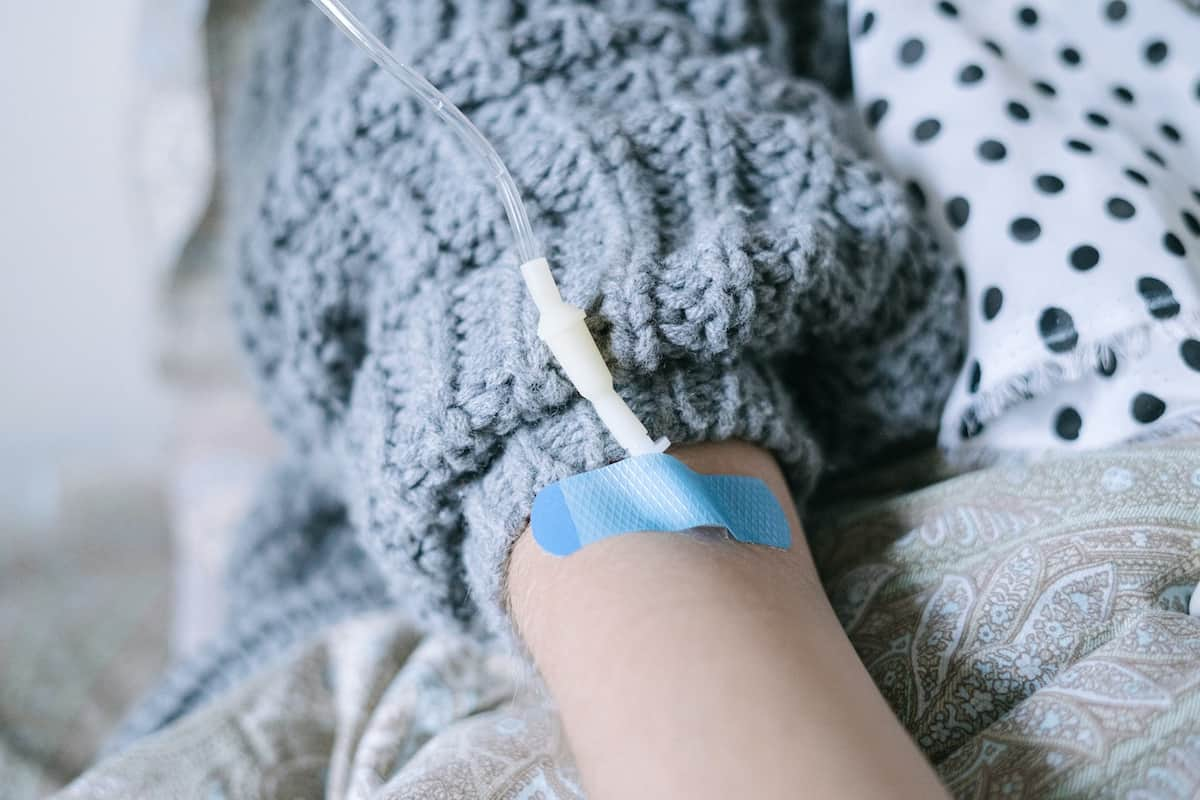
World Cancer Day encourages research and healthy lifestyles.
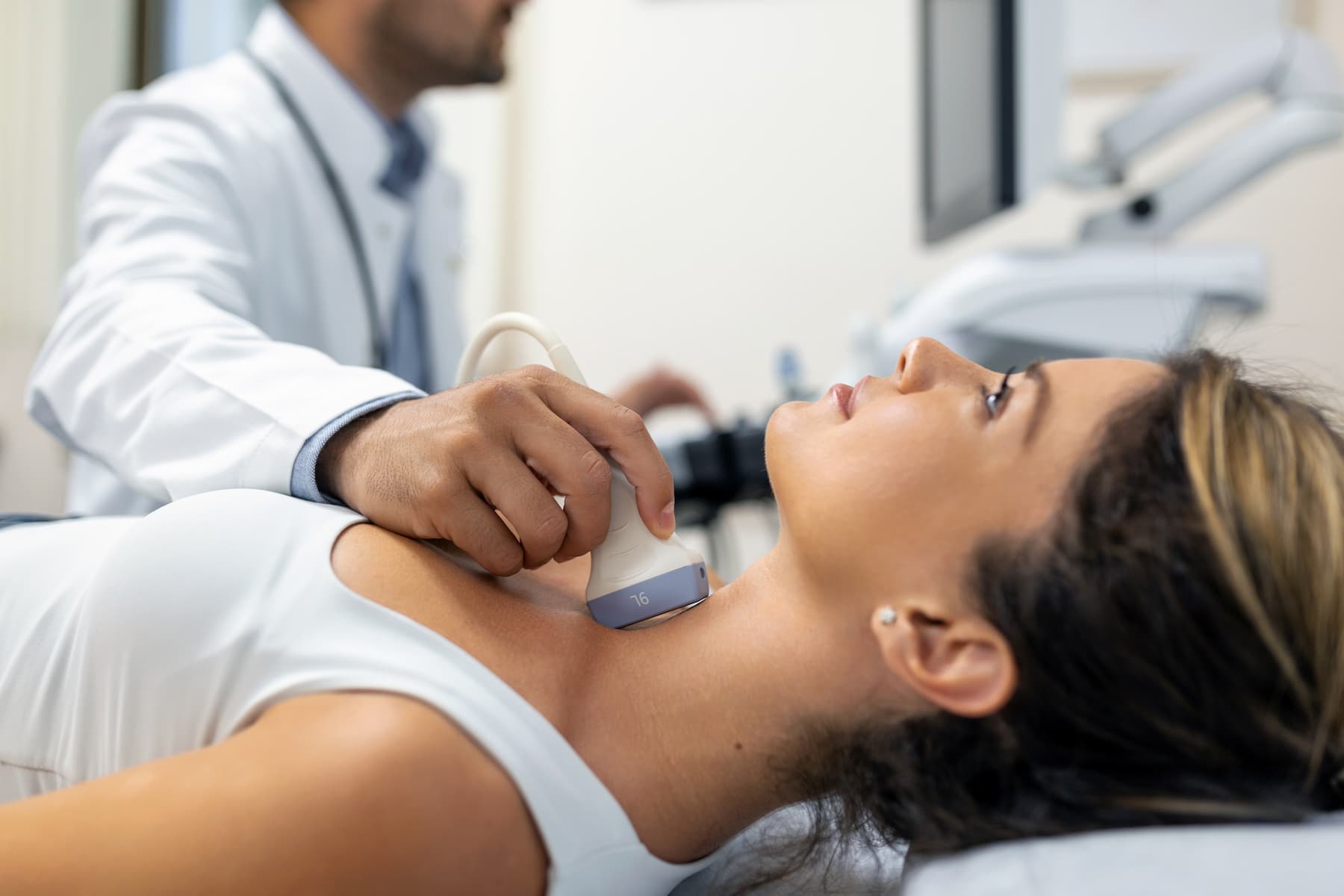
January is thyroid disease awareness month. How to take care of this organ?
